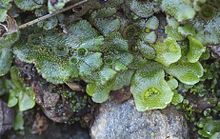
A gemma (English plural gemmas, Latin plural gemmae) is a single cell, or a mass of cells, or a modified bud of tissue, that detaches from the parent and develops into a new individual. This type of asexual reproduction is referred to as fragmentation. It is a means of asexual propagation in plants. These structures are commonly found in fungi, algae, liverworts and mosses, but also in some flowering plants such as pygmy sundews and some species of butterworts. Vascular plants have many other methods of asexual reproduction including bulbils and turions.
In mosses and liverworts

The production of gemmae is a widespread means of asexual reproduction in both liverworts and mosses. In liverworts such as Marchantia, the flattened plant body or thallus is a haploid gametophyte with gemma cups scattered about its upper surface. The gemma cups are cup-like structures containing gemmae. The gemmae are small discs of haploid tissue, and they directly give rise to new gametophytes. They are dispersed from gemma cups by rainfall.
The gemmae are bilaterally symmetrical and are not differentiated into dorsal and ventral surfaces. The mature gemmae fall on the ground and if conditions are suitable their germination starts immediately. The surface of the gemma which comes in contact of the soil gives out many rhizoids. This surface eventually becomes the lower(ventral) surface of the thallus. Meanwhile, the apical cells present in the two lateral notches become active and form two thalli in opposites directions.
Endogenous gemmae are also produced in liverworts, these are ovoid or ellipsoidal shaped, 2 celled at leaf tips or margins. Examples such as Bazzania kokawana (Fossombroniaceae), Endogemma caespiticia and also Riccardia species.
References
- "Pygmy Sundew Gemmae". Cascade Carnivores. 2011. Retrieved December 14, 2011.
- Hughes, Stanley John. On conidia of fungi, and gemmae of algae, bryophytes and pteridophytes. NRC Research Press.
- Smith, AJE (1989) The Liverworts of Britain and Ireland, Cambridge University Press, Cambridge.
- Kishan Gopal Ramawat, Jean-Michel Merillon and K. R. Shivanna (Editors) Reproductive Biology of Plants (2016), p. 70, at Google Books
External links
- Marchantiales – diagrams and micrographs of liverwort gemmae
This plant morphology article is a stub. You can help Misplaced Pages by expanding it. |
This mycology-related article is a stub. You can help Misplaced Pages by expanding it. |